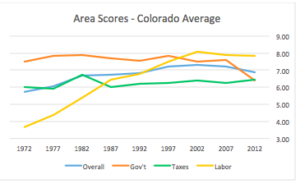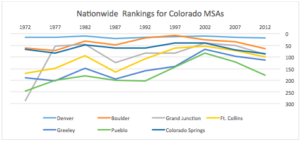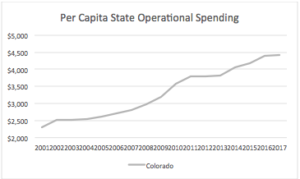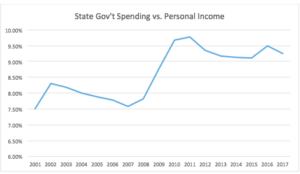Colorado cities are among the most economically free – and therefore among the most competitive – in the country, but a new report from the Reason Foundation shows that freedom and prosperity is being eroded by a growing state government.
Using publicly available data, Dean Stansel, an economics research associate professor at Southern Methodist University (SMU), has rated the 52 Metropolitan Statistical Areas (MSAs) over 1 million in population, and the 330 MSAs with population under 1 million. Denver rates 18th in the country in the first category, while 5 small Colorado MSAs rate in the top half of the second category, including four in the top third.

That’s the good news. The bad news is that things have gotten worse for those Colorado MSAs between 2002 and 2012, the last year for which full data is available.
Stansel divided his research into three categories: Government Spending, Taxes, and Labor Freedom. His calculations include state-level spending and taxation, in order to account for all local variations across the country. He calculates individual scaled scores for each area, and then averages them together to get the overall score for an MSA.
The Colorado MSAs are Denver, Boulder, Pueblo, Greeley, Grand Junction, Colorado Springs, and Ft. Collins. Averaged together, their overall scores were rising until 2002.
The effects on Colorado’s rankings have been predictable. In 1997, Boulder was ranked the 8th-most economically free MSA in the United States. In 2002, Denver cracked the top 10. And that year, all six smaller MSAs were in the top 100, even traditional laggard Pueblo.
Not surprisingly, Colorado’s Taxation Score got a little bit of a boost after the passage of TABOR; not as much as you might think, although it has managed to hold onto it.

The biggest change concerns Government Spending as a Percentage of Per Capita Income, and most of the damage has been done at the state level. On the whole, that score relative to the rest of the country was improving until 1997. Then the post-9/11 recession and the Great Recession hit. Not only did personal incomes decline, but state government spending per capita continued to increase.
Averaged over the seven Colorado MSAs, state government spending has come down slightly, but still remains well-elevated over its pre-Great Recession levels.
One might think that the same would be true of local government spending. However, totaling the large- and medium-sized cities and the counties in the Denver-Aurora-Lakewood MSA, local government spending actually declined from 2009-2015. Presumably, this is a result of TABOR restrictions, and the temporary unwillingness of cash-strapped citizens to approve tax increases.
The government spending that is hurting Colorado cities’ economic freedom and their associated prosperity is due almost entirely to the state.

Also significant has been the change in labor freedom. Labor freedom increased from about 1972 until about 2002, as the economy shifted from heavily unionized industries such as mining and drilling to a more diverse and more service-oriented base.
Since then, however, the increasing size of government – usually, though not always, state government – has caught up with it. The percentage of the work force engaged in state or local government determines the extent to which private enterprise has to compete for workers against the government. The more people engaged in government work, the less free the labor market.
To some extent, this is an artifact of when the study ended. Since Stansel was using the Census’s quinquennial survey of local governments, he had to end it in the last year for which there was data – 2012. In that year, total employment in many localities was only slowly beginning to recover, even as state and local employment continued to rise or hold steady.

The Census has completed data collection for the 2017 edition, and the reports should be published sometime this year. However, using data from the Bureau of Labor Statistics, we can see that since 2012, for most of the jurisdictions, the proportion has held steady or declined somewhat. However, Boulder, Denver, and Colorado Springs MSAs have all seen increases in state government employment, helping to drive down both their scores and their rankings.
The lesson is clear for Colorado policymakers. Despite their best efforts, Colorado localities are laboring under the burden of increased state spending. That needs to be reined in, and local governments need to resist the temptation to engage in economically destructive behaviors like boosting the minimum wage.
Joshua Sharf is a fiscal policy analyst at the Independence Institute, a free market think tank in Denver.


